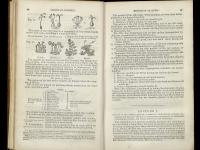When thinking about education in 1800s, women do not particularly come to mind as well-known scientists. Rather, famous women were usually tagged as poets or writers, such as Emily Dickinson and Jane Austen. Yet our collections at HSP show that even in the early 1800s, women were using science textbooks written by women and for women. In fact, these textbooks bring up a subject that we are still debating today: Are women are more likely to enter a STEM (science, technology, engineering, and math) field if they have other female role models to look up to? In the early 1800s, women, such as Almira Lincoln Phelps, had a plan in mind to answer that question with texts like Familiar Lectures on Botany, Botany for Beginners, and Chemistry for Beginners. These pioneering women believed that, by adding poetry and literature to science concepts, women would be more likely to grasp the concept and further their studies in the sciences. Now, almost two hundred years later, the concept of women in STEM careers hold largely the same idea to help bridge the gender gap.
The Historical Society of Pennsylvania is proud to host a free Teacher Workshop on Tuesday, April 28th from 4:30-6:30pm, on combining History with STEM. This program will take place in conjunction with the Philadelphia Science Festival. By looking at the history of women and science, and learning their experiments and lessons as they would have been taught almost two hundred years ago, teachers will go home with a new way of teaching STEM topics through historical primary sources. Topics include creating a herbarium, prisms, and nature printing as well as poetry to would accompany the subjects. The textbooks used in this workshop were the premier education tools for the women’s academies of the early 19th century and would have been the books that Emily Dickinson studied during her time at Amherst Academy.
To register for this event, please check out our calendar and click register now on the right hand side. It is free and all attendees will receive a copy of our latest issue of Pennsylvania Legacies on the History of Science, which includes a ready-made lesson plan and helpful resources for all ages. If you have any questions please feel free to contact us.

